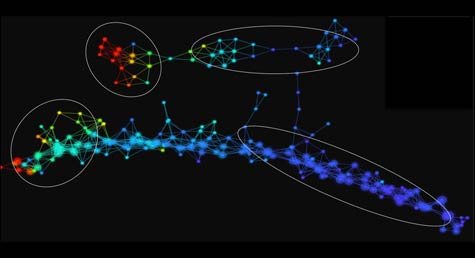It is one thing to be able to load all the information on a topic into a supercomputer and spit out answers to questions; it’s quite another to be able to actually help end users frame the questions.
With that goal in mind, Ayasdi has developed an analytics application based on machine learning software that discovers the relationships between massive amounts of data without having to hire a huge number of consultants to create a taxonomy around that data.
Fresh off of raising another $55 million in venture capital that was announced today, Ayasdi CEO Gurjeet Singh says Ayasdi was originally developed at the behest of the Defense Advanced Research Projects Agency (DARPA) and the National Science Foundation (NSF). The company’s Topological Data Analysis (TDA) machine learning software, says Singh, applies the mathematical principles of shape to identify meaningful patterns and values within complex datasets. That eliminates the need for time-consuming, iterative approaches to data analysis that rely on experts to ask the right questions and oftentimes write code, says Singh.
While interest in cognitive computing applications has been running high ever since IBM unveiled the Watson platform, Singh says the IBM approach is overly dependent on consultants to first shape massive amounts of data in a way that can be consumed by Watson. In contrast, Singh says Ayasdi is using machine learning software to essentially democratize advanced analytics in a way that helps businesses first discover the relationship between datasets and then iteratively interrogate that information.
The end goal, says Singh, is to provide a mechanism through which both new and existing data sources can continuously be correlated to enable everyone from financial analysts to doctors to make insightful decisions based on all the available data.
Available on premise or in the cloud, Ayasdi already counts Citigroup, Credit Suisse, Siemens, Lockheed Martin, Mercy health system, Mount Sinai School of Medicine and UCSF Medical Center among its customers and has announced alliances with Cloudera, Hortonworks, Intel and Teradata.
The degree to which machine learning applications will redefine advanced analytics as we currently know it remains to be seen. But the days when decisions were made based on aggregates of a subset of data that led to, at best, informed guesses being made are rapidly coming to a close.




